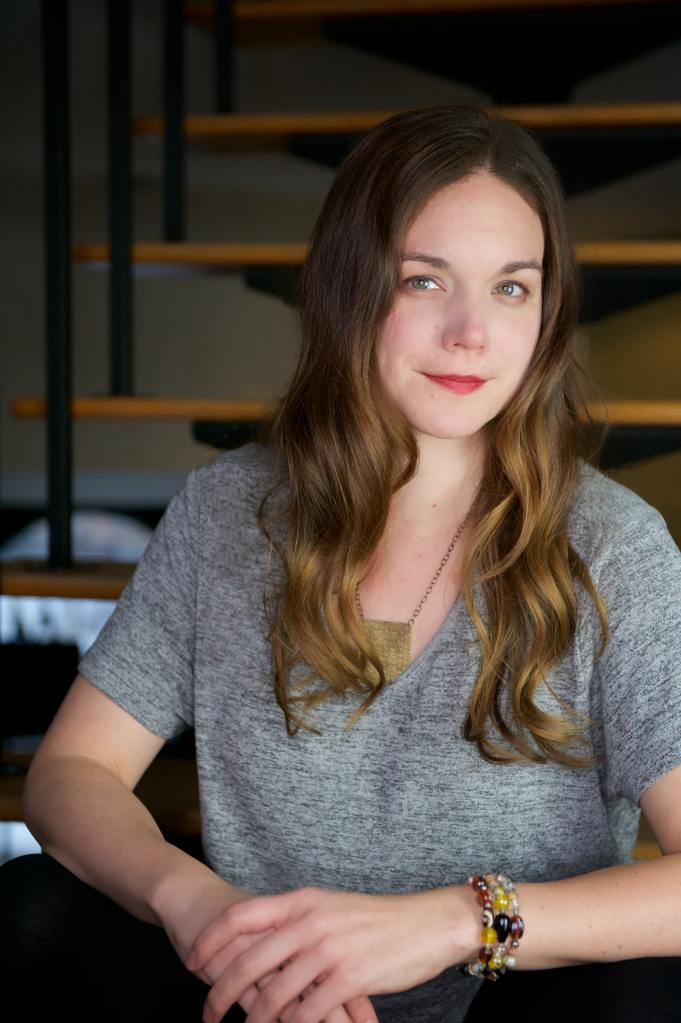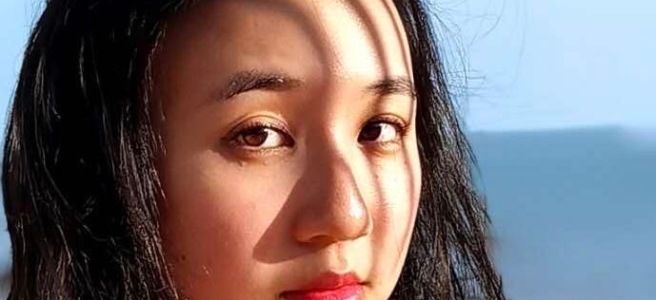There is Still Singing in the Afterlife, by JinJin Xu (Radix Media, 2020)
Winner of the inaugural Own Voices Chapbook Prize selected by Aria Aber
Review by Jeri Frederickson
There Is Still Singing in the Afterlife drew me in through its imagery and unabashed closeness to intimate loss and historical grief. You may find yourself and echoes of your own family in this debut collection by JinJin Xu. Drawing on personal experiences, playing with language and visual poetry, these poems shine a light for readers to see our own paths in the aftermath of complex family dynamics and loss.
We are in an afterlife of our own in 2021. I imagine this collection was written and set for publication before the Covid-19 global pandemic, and yet it entered the world right in the middle of it. Fortunately for us, as the world tries to find a post-Covid, or a Covid+ world, There is Still Singing in the Afterlife lifts the burden of finding a way. Xu visualizes an afterlife of both global and personal loss, chaos, and misunderstandings. As I read, I kept asking myself how does this collection feel so alive, like a song, despite its often heavy content? Xu shows the reader a way to sing again and a way to live through play, even as we grieve.
As is often the case with a contest-winning chapbook, There Is Still Singing in the Afterlife has already received several reviews; I agree with previous reviews asserting the language’s poignancy and intimate closeness. The language draws us into the longing and hardship inside familial ties in poems like “New Year’s with my Aborted Sister,”
& my poor mother, with only a daughter to her name
Melts her red tears into the little girl
I have long searched for.
I am her daughter in this life, her mother in the next.
I undress her grief, suckle cancer from her breasts
Xu’s precise language affirms and eases the weight of similar grief. Some reviews of this chapbook have pointed to the titular poem or to the “To Red Dust” poems to uplift Xu’s exploration of and confusion with familial bonds. While I find their perspective interesting and certainly relevant to poems like “New Year’s with my Aborted Sister,” I’m most interested in another aspect of this collection. Xu’s playfulness through language and the visual design of the collection includes glossy images that emboss, strike-through, or erase text, and the text moves across the page with a playfulness that first caught my attention when thumbing through the pages. Even before I entered the words as individual units of meaning, this collection took on a sense of play.
“To Red Dust” plays with the book as a physical object, and the reader gets to be part of the play. The words flow in portrait as well as landscape across the pages of this poem. The book’s need to be turned and engaged with as a physical object was a delight as Xu weaves heady ideas and complicated emotions into physical images:
As if I am not of my father’s body, I write
My name into my exhale, please –
A swipe of his palm –
Do not leave us in the red dust –
“Red Dust” sets the rhythmic pace of the collection, acting as the inhale and exhale while making the reader crane her neck and turns the page around and around even as Xu turns the ideas of family around and around.
At times, I didn’t understand quite what was going on in a poem, and I was surprised to find this never bothered me. Xu interweaves the senses with an emotional understanding even when the logic or narrative seemed out of reach:
unnameable mother
sat gashing fish scales
into the tremble
of a bucket
between her legs,
not yet knowing
the cost
of a bullet fired
at dawn
into the belly
of her
poem –
I didn’t understand all of what was going on in each scene of “Showing my Mother a Censored Film She Cannot Unsee, in Three Acts”, but I loved the playfulness of the poem’s styles and always felt drawn into the poem and landed with the poem’s end. Xu’s ability to play in this weaving creates a sense of trust in the reader to go along with the poem.
Xu plays with form through erasure in “The Revolution is Not a Dinner Party.” This poem of very short lines creates a melody even as it erases its source. Chairman Moa’s Little Red Book is the source material, and the poem lifts extended images such as:
Blind war
xxxxxxin thick ropes.Ghosts,
xxxxxxa now commonLanguage. Not
xxxxxxliving. Paper.
We have many personal, societal, and governmental ghosts, and Xu’s deft words slide over playful rhythms and forms to give us a doorway to dance through into the afterlife of those griefs. There Is Still Singing in the Afterlife is a complex and visually compelling debut to hold. Let us look forward to more from JinJin Xu.

JinJin Xu is the 2020 winner of the Poetry Society of America’s George Bogin Memorial Award. She has received honors from Southern Humanities Review, Tupelo Press, and the Thomas J. Watson Foundation. Her films have exhibited at Berlin’s Harun Farocki Institute and NYC’s The Immigrant Artist Biennial.
Born and raised in Shanghai, she received her MFA in Poetry from NYU, where was a Lillian Vernon fellow, and now teaches hybrid ballet/poetry workshops through NYU Tisch’s Art of Future Imaginations Grant, and serves as Books Editor of Washington Square Review. Her debut chapbook There Is Still Singing in the Afterlife was selected by Aria Aber for the inaugural Own Voices Chapbook Prize (Radix Media) and was published November, 2020. Her second chapbook This Is My Testimony is forthcoming Fall 2021 from Black Warrior Review. Find more of her work at jinjinxu.com.

Title: There is Still Singing in the Afterlife
Author: JinJin Xu
Publisher: Radix Media: November 20, 2020
ISBN: 978-1-7340487-2-8
$12, 48pp

Risa Denenberg is the curator at The Poetry Cafe.

